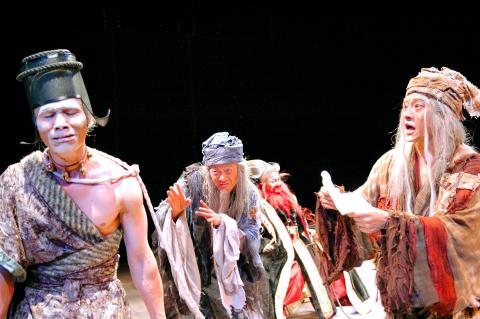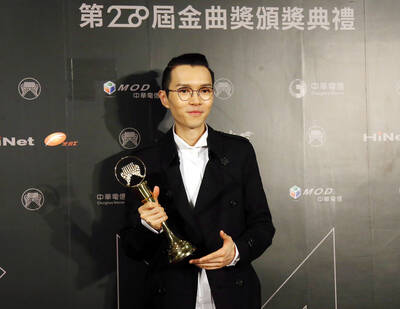The Contemporary Legend Theater, a Taiwanese theater group, departed Tuesday to perform Waiting for Godot for French audiences in Paris tomorrow and Saturday evening at Theatre de l’Agora.
Waiting for Godot is a tragicomedy originally written in French by Samuel Beckett in the late 1940s. The play in two acts tells the story of two tramps, Gogo and Didi (adapted from Estragon and Vladimir of the original play), who endlessly wait for someone named Godot to arrive. They do not know Godot or why they are waiting for him, and neither are they sure if or when he will come.
This Chinese language adaptation is produced by Wu Hsing-kuo, director and one of the founders of the theater group. Wu said, “In 1997 I asked modern theater master Chung Ming-der how I could get started in modern theater. He then recommended Beckett’s Waiting for Godot because the author was the only one to win a Nobel Prize with a script.”

Photo: Courtesy of Contemporary Legend Theater
照片:當代傳奇劇場提供
Wu said, “I thought the script was boring, and wondered how Beckett could have possibly won a Nobel Prize in literature. But after thinking about it for a week I suddenly ‘got’ three passages of the play, and finally decided to work on it after the SARS crisis in 2004. The play was officially put on in 2005. In fact, it’s about waiting for hope, not Godot.”
Wu said when he was working on the adaptation, he referred to various Chinese translations. Some were directly translated from French, and some were from English. Each version had its own characteristic style. He eventually integrated all of the styles to create one he believes best suited the play.
Wu stressed, however, that it is up to each individual to interpret Waiting for Godot. He said, “If Beckett were to have seen my interpretation of the play, he might have thought it excessive. All I can say is we put our all into this production.”
A member of the theater group explained that the most important aspect of the play was how it brought out the similarities between the cultures of the East and West. “The performances were actually quite funny, but the meaning of the play itself is quite poignant,” she said.
Wu said he hopes French audiences can discover how comedy is presented in Chinese drama, and how Chinese people perform comedy.
Wu said, “I don’t think the main significance of Waiting for Godot is about waiting, but about suffering. The suffering comes from desolation. If the play was missing this ‘waiting’ factor, people would cease to understand how bitter this suffering actually is.”
The theater group is also invited this year to Edinburgh International Festival to perform an adaptation of Shakespeare’s King Lear for a four-day run in August. The Contemporary Legend Theater is the first Taiwanese performing art group to be invited to this festival.
(BY TAIJING WU, TAIPEI TIMES)
來自台灣的當代傳奇劇場週二出發前往法國巴黎,明日及週六晚間,將於艾格拉劇院給法國觀眾呈現「等待果陀」。
「等待果陀」是齣原本以法文撰寫的悲喜劇,一九四零年代末由山謬‧貝克特創作。這齣兩幕的戲劇所講的,是哭哭與啼啼兩位流浪漢(原劇為愛斯特拉岡與弗拉季米爾),無窮無盡地等待個叫做果陀的人來。他們不知道果陀是誰,也不知道為何等他,並且也不知道何時會來、會不會來。
這齣戲由當代傳奇劇場創始人之一暨團長吳興國改編成中文。他說,「一九九七年我問現代劇場老師鍾明德,進入現代戲劇的領域應該從哪開始。他就推薦貝克特的等待果陀,因為這是唯一以劇本形式得到諾貝爾獎的作家。」
吳興國說,「我看了劇本覺得很無聊,很納悶貝克特怎麼會得到諾貝爾文學獎。但是思考一星期後,受到三段的啟發,於是二零零四年SARS之後決定要做等待果陀,直到二零零五年這齣戲才正式推出。等待事實上是在等待希望,而不是果陀。」
編寫的時候吳興國參考其他中文翻譯版本。有的直接從法文翻譯,也有從英文翻譯。每種版本都各有特色。最後融合各種風格,創造出一種他認為這齣戲應該要有的風格。
但是吳興國強調,等待果陀應該是什麼樣子是見仁見智。他說,「假如貝克特有機會看到我做的等待果陀,他可能會覺得太多了。我只能說,我們以最虔誠的態度,盡最大的努力完成這個作品。」
一位劇團人員說,這齣戲最重要的面向,就是突顯東西文化相似之處。她說,「演員呈現這齣戲的方法很好笑,但是本身的意義卻讓人們感到哀傷。」
吳興國說,希望法國觀眾能了解中國戲劇用什麼方法呈現喜劇,也想讓他們了解華人用什麼方式呈現喜劇。
吳興國說,我覺得等待果陀最大的意義不是等待,而是痛苦,是孤寂的痛苦。但如果這齣戲少了等待的成分,那麼人們就不知道這個痛苦有多痛。
劇團今年八月也受邀英國愛丁堡國際藝術節,表演改編自莎士比亞名劇「李爾王」的「李爾在此」,表演將連續四天。當代傳奇劇場為第一個受邀於該藝術節的台灣劇團。
(台北時報吳岱璟報導)

Australia’s strict immigration policies have long been criticized, particularly for how they treat people with disabilities. Having been residents of Australia for years, Scottish Laura Currie and her Italian partner, Dante Vendittelli, recently experienced the impact of these immigration policies. Their son Luca, born in Australia and diagnosed with cystic fibrosis, became the reason their residency application was denied due to the anticipated high healthcare costs. Had Luca been healthy, there would have been no objections to their permanent residency. This case not only highlights discrimination against disabled individuals, but also raises questions about fairness and inclusion within Australia’s immigration

A ‘Dutch angle’ is a classic camera technique that has been used in filmmaking since the 1920s, when it was introduced to Hollywood by German Expressionists. Why is it called the Dutch angle if it’s actually German? In fact, it has no __1__ to the Netherlands. The term “Dutch” is widely believed to be a misinterpretation of “Deutsch,” which means German in the German language. In any event, the name stuck, and the Dutch angle remains a popular cinematic tool to this day. This technique involves tilting the camera on its x-axis, skewing the shot to create a sense of

A: After holding nine concerts in Kaohsiung and Taipei recently, “God of Songs” Jacky Cheung will stage three extra shows later this week. B: They’re compensation for the three shows he postponed last year due to illness. A: He also canceled three more shows in Guangzhou last month. His health is worrisome. B: When touring Guangzhou, he dedicated his hit “She Is Far Away” to late singer Khalil Fong. That’s so touching. A: Online music platform KKBOX has also launched a campaign to pay tribute to Fong. I can’t believe he died so young: he was only 41. A:

A: After “God of Songs” Jacky Cheung sang for late singer Khalil Fong recently, music streaming service KKBOX also paid tribute to Fong by releasing his greatest hits online. B: The 20th KKBOX Music Awards ceremony is taking place at the K-Arena in Kaohsiung tomorrow. Fong performed at the ceremonies in the past. A: Who are the performers this year? B: The performers include Taiwanese groups 911, Wolf(s), Ozone, Singaporean pop diva Tanya Chua, and K-pop group Super Junior. A: South Korean stars actually took four spots among KKBOX’s 2024 Top 10 singles, showing that K-pop is still